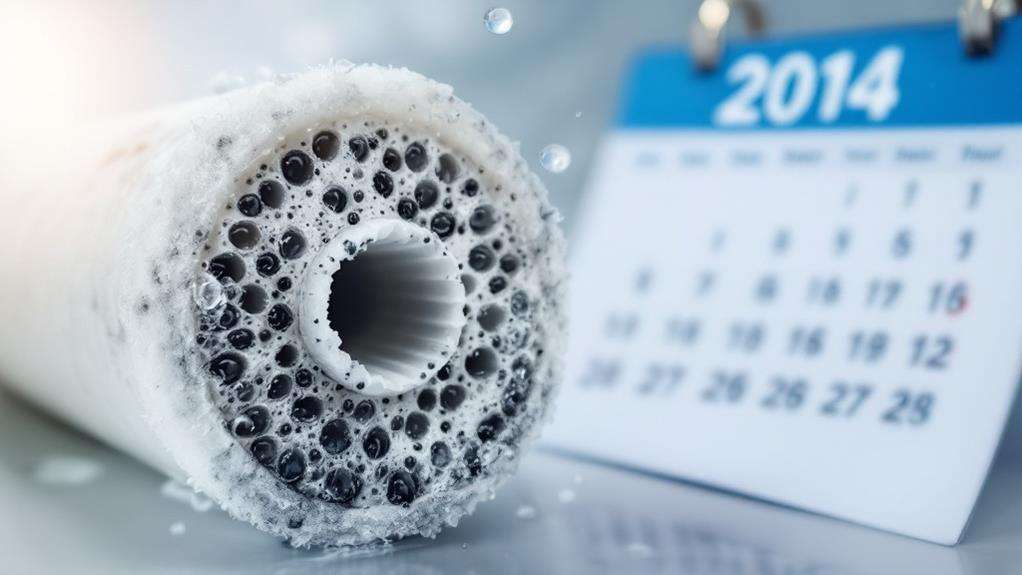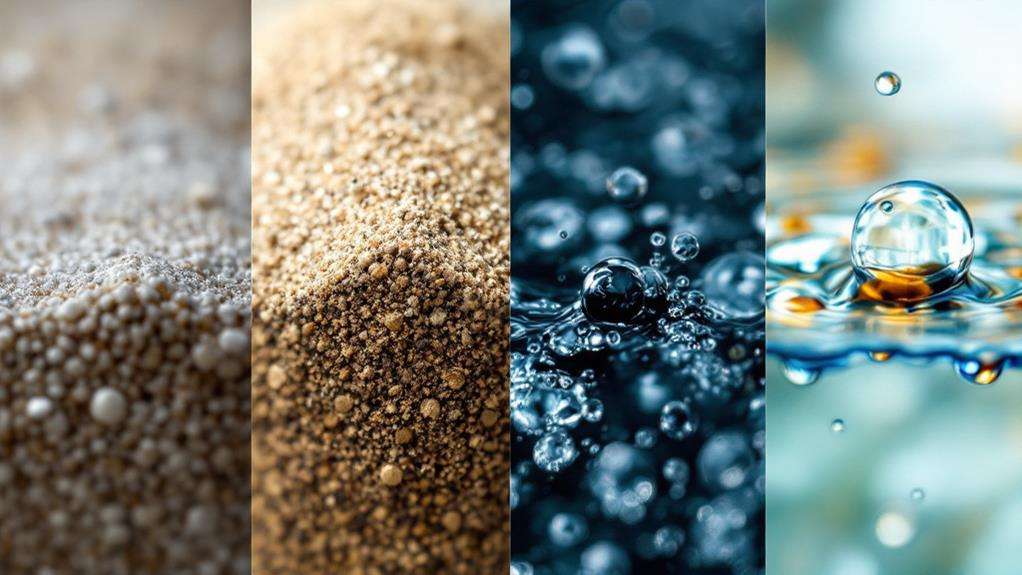How to Know When It’s Time to Replace Your Water Filter
You'll know it's time to replace your water filter when you notice changes in water quality, taste, or flow rate. Watch for decreased water pressure, increased chlorine odor, or a chemical taste. Cloudy or discolored water, visible debris, and changes in water characteristics are also signs of filter degradation. Most manufacturers recommend replacing filters every 6-12 months, but your usage patterns and water source can affect this timeline. Pay attention to your specific filter type, as replacement frequencies vary from 2-4 months for pitcher filters to 6-12 months for whole-house systems. By understanding these indicators, you'll be better equipped to maintain ideal water quality in your home.
Understanding Water Filter Lifespan
Most water filters have a finite lifespan, typically ranging from 6 to 12 months. Understanding when it's time to replace your filter cartridge is paramount for sustaining optimal water quality and system efficiency. The lifespan of your water filter system depends on several factors, including water consumption volume, sediment and contaminant levels, and water hardness.
Manufacturers often provide recommended replacement schedules based on average usage, but your actual needs may vary. It's vital to monitor your water filter's performance to determine when it needs replacing. Pay attention to changes in water flow, pressure, taste, odor, and appearance. These can be indicators that your filter's effectiveness is diminishing.
Ignoring filter replacement can lead to reduced system efficiency, increased bacterial growth, and degraded water quality. To certify your water filter system continues to function properly, make a habit of checking it regularly. If you're unsure about when to replace your filter, consult your system's manual or contact the manufacturer for guidance. By staying proactive about filter replacement, you'll maintain the best possible water quality for your home or office.
Signs of Filter Degradation
While understanding the general lifespan of water filters is important, recognizing specific signs of filter degradation is key to maintaining your water quality. You'll want to pay close attention to changes in your water's characteristics and your filter's performance.
One of the most noticeable signs that it's time to replace your filter is a decrease in water flow or pressure. If you're experiencing reduced water output, it's likely your filter has become clogged and needs changing. Another clear indicator is when your water tastes or smells different. If you detect an increased chlorine odor or chemical taste, your filter may no longer be effectively removing these substances.
Visual cues are also important. Keep an eye out for cloudy or discolored water, which suggests your filter isn't working properly. Similarly, if you spot visible debris or particles in your water, it's a sign that contaminants are passing through the filter. These changes in appearance indicate that your filter's effectiveness has diminished and it's time for a replacement.
Monitoring Water Quality Changes

Keeping tabs on your water quality is crucial for determining when to replace your filter. As you use your water filter systems, pay attention to changes in your filtered water's taste, odor, or appearance. These alterations often signal it's time for filter replacements.
You might notice a decrease in water pressure or flow rate, which can indicate a clogged filter. If you're seeing more sediment, particles, or discoloration in your water, it's a clear sign that your filter isn't effectively removing contaminants anymore. Water tastes can also change, with increased chlorine or chemical smells suggesting the filter's adsorption capacity has been exhausted.
Keep an eye out for cloudy or murky water, as this appearance is a telltale sign that your filter is no longer functioning at its best. By regularly monitoring these aspects of your water quality, you'll be better equipped to know when to replace your water filter. Remember, timely replacements guarantee you're always drinking clean, safe water and protect your plumbing system from potential damage caused by ineffective filtration. Stay vigilant and don't hesitate to replace your filter when these signs appear.
Manufacturer Recommendations
Beyond monitoring water quality changes, you'll want to ponder manufacturer recommendations for filter replacement. Most manufacturers suggest replacing water filters every 6 to 12 months, depending on your water usage and quality. These guidelines are based on average filter capacity and estimated usage, not the actual volume of water filtered.
It's essential to consult your specific filter model information and follow the manufacturer recommendations. Ignoring these guidelines can lead to reduced filter effectiveness and potential damage to your water-using appliances. Remember, replacement schedules are designed to maintain ideal water quality and system performance.
Some high-end filtration systems come equipped with integrated filter life monitors that alert you when it's time to replace the filters. If your system doesn't have this feature, you'll need to keep track of when you last changed the filter and plan accordingly.
Usage Patterns and Replacement Frequency

Your household's water usage patterns play an essential role in determining how often you'll need to replace your water filter. If you have a large family or use a lot of water daily, you'll likely need to change your water filters more frequently than someone living alone or using less water.
Pay attention to your water's flow rate, as a decrease can indicate it's time to change the filter. If you notice a slower stream from your faucet or reduced water pressure, it's probably time to replace the filter. Additionally, if you start to detect changes in your water's taste or smell, don't delay in switching out the old filter for a new one.
To stay on top of your filter's lifespan, consider setting prompts based on your usage patterns. For instance, if you typically need to replace your filter every three months, mark your calendar or set a phone alert. Remember that some households might require replacements every month, while others can go six months between changes. By understanding your unique usage patterns, you'll maintain your water filter's effectiveness and keep your water clean and fresh.
Impact of Water Source
While understanding your household's water usage is important, the source of your water plays a significant role in determining how often you'll need to replace your filter. If you're on a municipal water supply, you're likely to enjoy longer filter lifespans due to lower levels of contaminants and particulates. However, if you rely on well water, you may find yourself changing filters more frequently, especially in whole house or reverse osmosis systems.
Well water often contains higher levels of sediment, minerals, and other impurities that can quickly clog filters and reduce their effectiveness. You might notice signs like water tasting different or slow water flow, indicating it's time for a replacement. On the other hand, if you have additional water treatment systems like softeners, your filters may last longer.
Keep in mind that seasonal changes can affect your water quality and filter lifespan. Spring runoff, for instance, might introduce more sediment into your water supply, necessitating more frequent changes. Pay attention to changes in water pressure or taste, as these can be indicators that your filter needs replacing, regardless of your water source.
Filter Type Considerations

When selecting a water filter, it is critical to evaluate the type of filter you're using, as this drastically impacts how frequently you'll need to replace it. Different water filtration systems have varying lifespans, so understanding your specific Water Filter Needs is paramount.
Pitcher filters, which are common in many households, typically require replacement every 2-4 months. If you've opted for a faucet-mounted filter, you'll need to change it more regularly than whole-house systems. Under-sink and refrigerator filters generally last around 6 months, while whole-house filters can function effectively for 6-12 months.
For those using advanced filtration methods like reverse osmosis (RO), you'll be pleased to know that RO membranes can last 3-5 years. However, it is crucial to note that sediment filters, which trap larger particles, often need more frequent replacement than carbon filters.
Your filter's intended use also plays a role in determining its lifespan. Filters designed to remove specific contaminants or improve taste may have different replacement schedules. Always follow the manufacturer's recommendations to maintain optimal water quality and proper flow through your filtration system.
Visual Inspection Techniques
Regular visual inspections of your water filter can provide meaningful information regarding its condition and performance. When examining your filter, pay close attention to the cartridge itself. Look for signs of discoloration, debris buildup, or visible wear, as these indicate it's time for a replacement. It is crucial to recognize that different filter systems use various cartridge types, so familiarize yourself with yours.
Check the filter housing for cracks or damage, which could allow unfiltered water to bypass the filter. Inspect connections and the housing area for any leaks, as these may signal a worn or malfunctioning filter. Observe the water flow rate through your system; a significant decrease often means it's time for a new filter.
Performance Indicators

Efficiency is key when evaluating your water filter's performance. As your filter ages, it becomes less effective at removing harmful contaminants from your water. To determine if your filter needs to be replaced, pay attention to several performance indicators.
First, monitor the flow rate of your filtered water. If you notice a significant decrease, it's likely time for a replacement. Keep track of how long it takes to fill a glass or pitcher compared to when the filter was new. Additionally, check the taste and odor of your water. If you detect any unpleasant flavors or smells, your filter may no longer be functioning optimally.
Another important indicator is the Total Dissolved Solids (TDS) level in your filtered water. Use a TDS meter to measure and compare readings before and after filtration. If the difference between these readings diminishes over time, your filter's effectiveness is declining. Remember, a typical filter lasts about 2-6 months, depending on usage and water quality. By paying attention to these performance indicators, you'll maintain your water filter's ability to provide clean, safe drinking water for you and your family.
Maintenance Schedule Best Practices
To keep your water filter operating at peak performance, implementing a solid maintenance schedule is key. While different systems have varying requirements, it's generally recommended to replace your filter every six months. However, factors like water quality and usage can affect this timeline. Take care to follow the manufacturer's guidelines, as they know best how often your specific system needs consideration.
When you buy filters, consider purchasing in bulk to guarantee you always have replacements on hand. This practice can save you money and prevent lapses in filtered water availability. Set prompts on your phone or calendar to remind you when it's time for a change.
Run water through the new filter for a few minutes after installation
Clean the filter housing regularly to prevent buildup
Check for leaks or damage each time you replace the filter
Keep a log of filter changes to track performance over time
Flush the system before and after extended periods of non-use

